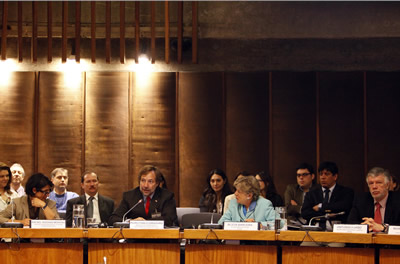European Union, Authorities and Experts Analysed Policies to Boost Investment in Broadband and ICT Services in the Region
The European Commission event was part of preparatory activities for the CELAC-European Union Summit of Heads of State and Government,
which will be held in January 2013.

(27 November 2012) The European Union (EU) and Latin American authorities and experts analysed policies to develop broadband in the region at the seminar on Broadband: investment for growth and equality, which took place today at the headquarters of the Economic Commission for Latin America and the Caribbean (ECLAC) in Santiago, Chile.
Participants at the event stated the need for greater coordination between the public and private sectors in terms of defining and implementing policies to extend broadband access in Latin America and the Caribbean.
According to ECLAC Executive Secretary, Alicia Bárcena, who was opening the seminar attended by broadband policymakers, telecommunications company representatives and EU and regional experts, "Broadband should be considered as a global public good, one that is not free but easily accessible. It is an essential element for achieving productivity, competitiveness and social inclusion".
She added: "In two years, we have reduced broadband costs by 63% and improved speeds. But we must focus on the gap in the region: access to 1 Mb can cost 31% of gross income, while in developed countries it is less than 1%. To close the gaps, the short-, medium- and long-term solution is investment".
Pedro Pablo Errázuriz, Chilean Minister of Transport and Telecommunications, pointed out that Latin America has a unique development opportunity: "The possibility of wisely using this transformation offers us an opportunity that only comes along every few centuries. Getting to the technological revolution on time has been the major challenge for the region, and we are convinced that technology and the digital revolution are key to eradicating poverty".
Policy Officer for Latin America of the European Commission Directorate General for Communications Networks, Content and Technology (DG CONNECT), Cristina Vargiolu, highlighted the importance of connectivity from a social perspective.
Ms. Vargiolu explained that "Information is power, and on this basis it is essential to ensure access to information and communications technologies (ICTs) to those who do not have it yet, in order to reduce social segregation. It is vital for all countries and regions to be able to integrate a basic platform for connectivity with citizens and encourage their participation, so as to narrow the digital divide".
The event was jointly organized by DG CONNECT, EuropeAid-Cooperation and development, the EU's European External Action Service, Chilean Undersecretariat for Telecommunications (SUBTEL) and ECLAC through the ECLAC @LIS2 project.
According to participants, it is fundamental to improve connectivity between Europe and Latin America. Experts underlined that this requires the installation of submarine cables between the two regions.
At the close of the meeting, delegates mentioned that the investment sums required for broadband infrastructure were much higher than current levels, and that mechanisms should be generated to increase public and private investment in line with growing demand.
They also indicated that the issues of expanding or universalizing broadband are similar among countries and regions, but that the solutions are local and should take account of each country's different socio-cultural, economic and geographical realities. They declared that the role of the State was fundamental in introducing policies to boost demand for connectivity, by emphasizing the perceived usefulness of broadband among users.
The seminar was part of preparatory activities for the Summit of Heads of State and Government of the Community of Latin American and Caribbean States (CELAC) and the European Union (EU), which will take place in Chile in January 2013, and its recommendations will be presented at the Summit.
On Monday 26 November, the ECLAC headquarters in Chile hosted the sixth meeting of the Regional Dialogue on the costs of international connections and their impact on broadband prices, which was attended by government officials and experts from Chile, Ecuador, Peru and Uruguay.
The Regional Dialogue on Broadband was set up in 2010 by ECLAC, which acts as its Technical Secretariat, and SUBTEL of Chile. There are currently 10 member countries in the region: Argentina, Brazil, Bolivia (Plurinational State of), Chile, Colombia, Costa Rica, Ecuador, Paraguay, Peru and Uruguay.
At the end of the meeting, representatives agreed to continue the work of the Dialogue to improve regional connectivity through the ECLAC Regional Broadband Observatory (ORBA), and make progress in harmonizing and standardizing a few key broadband indicators, that would be discussed and agreed upon by member countries.
Any queries should be sent to the ECLAC Public Information and Web Services Section.
E-mail: prensa@cepal.org, Telephone: (56 2) 2210 2040.
Follow us on: Twitter, Facebook, Flickr and YouTube.
Country(ies)
- Latin America
- European Union
Contact
Public Information Unit
- prensa@cepal.org
- (56 2) 2210 2040